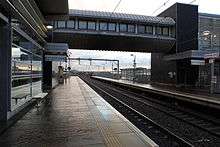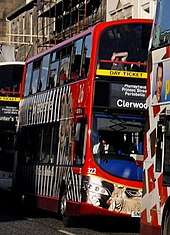Edinburgh Park railway station
Edinburgh Park railway station is a railway station in the west of Edinburgh, Scotland, serving the Edinburgh Park business park and the Hermiston Gait shopping centre. The new station building was designed by IDP Architects,[2] and it opened on 4 December 2003.[3] It is the first intermediate station between Haymarket and Linlithgow since 1951. Ticket barriers came into use on 25 March 2015.

| Edinburgh Park | |
|---|---|
| Scottish Gaelic: Pàirc Dhùn Èideann[1] | |
_station_(geograph_4167972).jpg) Entrance to Edinburgh Park railway station | |
| Location | |
| Place | South Gyle |
| Local authority | Edinburgh |
| Coordinates | 55.9276°N 3.3077°W |
| Grid reference | NT184712 |
| Operations | |
| Station code | EDP |
| Managed by | Abellio ScotRail |
| Number of platforms | 2 National Rail 2 Edinburgh Trams |
| Live arrivals/departures, station information and onward connections from National Rail Enquiries | |
| Annual rail passenger usage* | |
| 2014/15 | |
| 2015/16 | |
| 2016/17 | |
| 2017/18 | |
| 2018/19 | |
| History | |
| 4 December 2003 | Opened |
| National Rail – UK railway stations | |
| * Annual estimated passenger usage based on sales of tickets in stated financial year(s) which end or originate at Edinburgh Park from Office of Rail and Road statistics. Methodology may vary year on year. | |
There are two platforms, linked by a covered footbridge, which is accessible by either stairs or a lift. There is also a pedestrian underpass just outside the station, accessible from both platforms. Tickets are available from one of the two ticket machines.
Edinburgh Park station is on the edge of South Gyle, but should not be confused with South Gyle railway station which is 1 mile (1.6 km) away.
The railway through Edinburgh Park station was electrified (using overhead wires at 25 kV AC) in October 2010 as part of the Airdrie-Bathgate Rail Link project.
Edinburgh Trams
.jpg)
The Edinburgh Park tram stop (and the entire tram line) opened on 31 May 2014, the station then becoming a fully staffed rail/tram interchange. The tram stop is adjacent to the southern exit of the railway station.
The first tram (under test and without passengers) called at the stop on 8 October 2013.[4]
Services
Edinburgh to Dunblane, Glasgow Queen Street, Milngavie and Helensburgh Central services call at the station, providing eight trains an hour to Edinburgh city centre, two to Stirling, two to Glasgow Queen Street High Level via Falkirk Grahamston & Cumbernauld, and four to Glasgow Queen Street Low Level via Bathgate. The Milngavie and Glasgow Queen Street via Falkirk Grahamston do not run in the evenings or on Sundays, while the Dunblane services are hourly on a Sunday.[5]
Trains on the E&GR main line to Queen Street H.L via Falkirk High do not stop here and passengers wishing to travel to stations between Falkirk & Queen St H.L must change at Polmont during evenings and Sundays.
| Preceding station | Following station | |||
|---|---|---|---|---|
| Haymarket | Abellio ScotRail North Clyde Line |
Uphall | ||
| Abellio ScotRail Edinburgh–Dunblane Line |
Linlithgow or Falkirk Grahamston | |||
| Abellio ScotRail Glasgow-Edinburgh via Cumbernauld |
Linlithgow | |||
| Preceding station | Edinburgh Trams | Following station | ||
| Bankhead towards York Place |
York Place-Edinburgh Airport | Edinburgh Park Central towards Edinburgh Airport | ||
References
| Wikimedia Commons has media related to Edinburgh Park railway station. |
- Brailsford, Martyn, ed. (December 2017) [1987]. "Gaelic/English Station Index". Railway Track Diagrams 1: Scotland & Isle of Man (6th ed.). Frome: Trackmaps. ISBN 978-0-9549866-9-8.CS1 maint: ref=harv (link)
- "Edinburgh Park Station". IDP Architects. IDP Architects. Retrieved 25 March 2019.
- "Railway Stations Opened in the UK". Retrieved 8 April 2019.
- Slow tram test flanked by 21 contractors - Edinburgh Evening News
- Table 226, 228 & 230 National Rail timetable, December 2018

